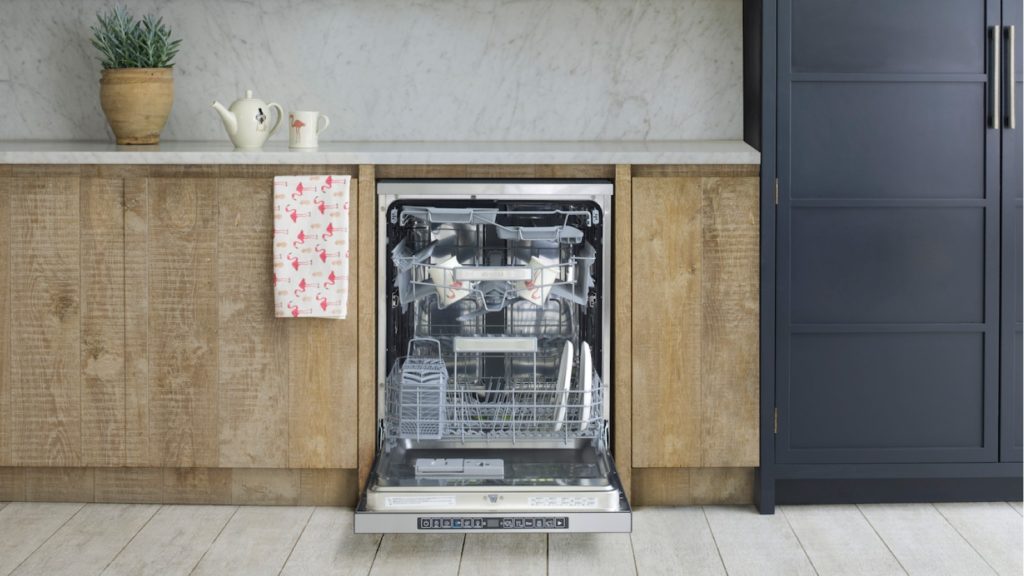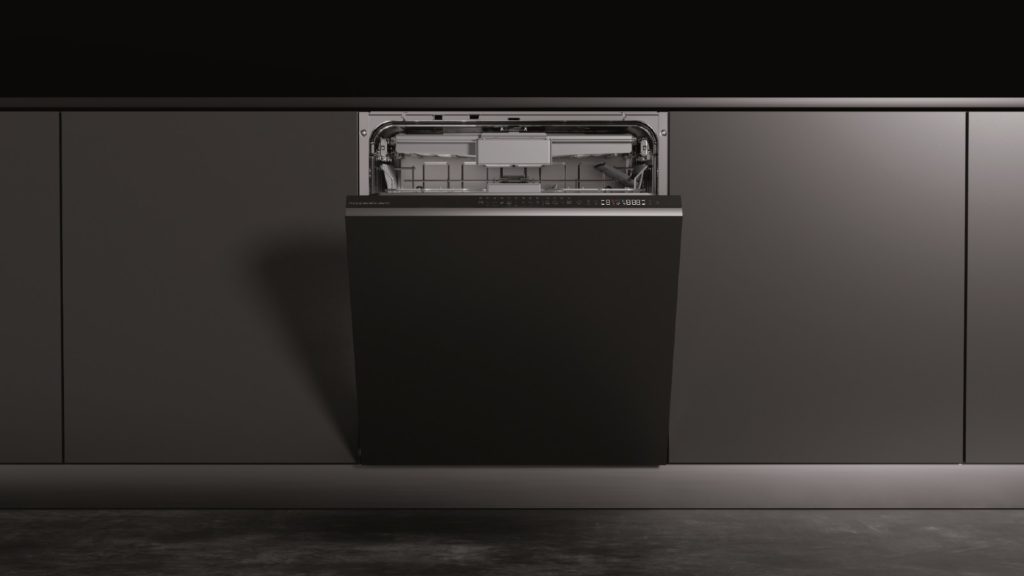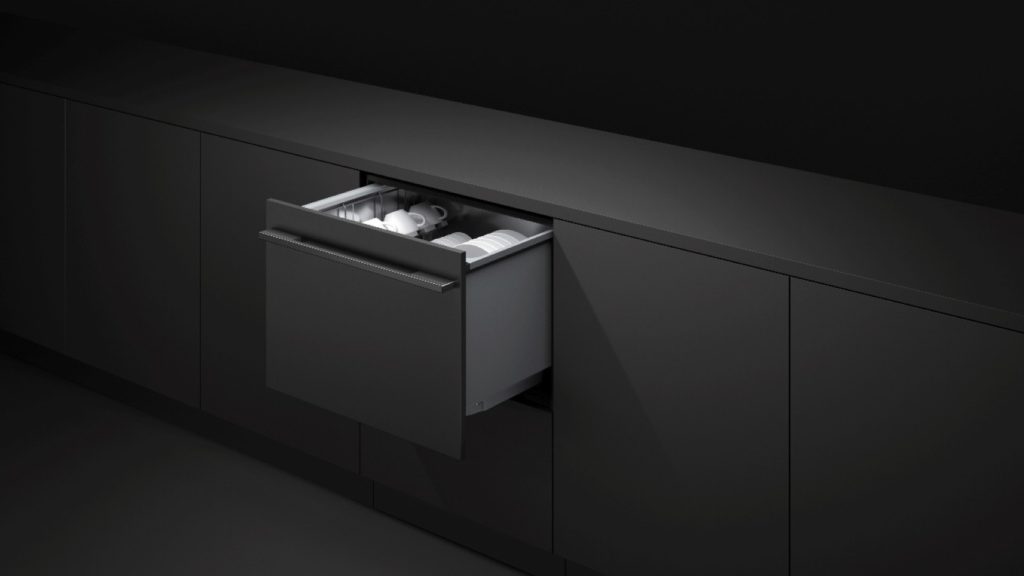Reductions in time, resource use and noise levels form a sales triptych for dishwashers, reports Philippa Turrell

Optimising resource consumption, the G 7160 SCVi dishwasher from Miele boasts AutoDos, which automatically dispenses detergent. It detects half loads and has AutoOpen Drying which lets fresh air in and reduces energy use
While the focus of dishwasher tech used to be on power, negating the need for pre-wash rinse and drying programmes so pots and pans are quickly ready for reuse, now performance is a given. So, the focus is on complementing consumer lifestyles.
Convenience remains key through time-saving programmes, and accelerated by the pandemic and people working from home, enhanced hygiene and reduced decibel levels have also grown in importance.
Sponsored Video
Optimising resources of water, detergent and energy is also key, and in the current economic climate as household bills continue to rise, this is only going to grow in importance in home finances.
Reducing resources
Busy lifestyles and need for reduce the use of resources has seen a greater development of faster programmes and a proliferation of half load functions.

The DF613PX dishwasher, from Smeg, has 27 minute and Eco settings, as well as Energysave technology which opens the door at the end of each drying cycle to save up to 20%
Smeg offers dishwashers which provide a 27-minute Quick Programme and Sharp Home Electronics QW-WNA28F39DW 15-place setting dishwasher has a 14-minute cycle.
Product manager at Smeg UK Lucy Dunstan comments: “It is important that everyday chores can be completed as quickly and easily as possible. That’s why several of our models feature a 27-minute Quick Cycle programme.”
Of course, a faster wash programme reduces energy used during a cycle, but manufacturers have continuously worked on delivering appliances which reduce water and optimise detergent.
Dishwashers category manager for Miele GB Sian Bailey comments: “Over the last 20 years, Miele has successfully reduced the energy consumption of dishwashers by 44% thanks to the work of our technicians.”
As well as wash programmes that adjust temperature and alignment of water jets, Sian Bailey adds: “Miele’s latest dishwashers also feature AutoDos, which can help users to save up to 30% of detergent by automatically dispensing the optimum amount needed for the size and soil of the load.”
And with the current economic climate seeing spiralling energy bills, along with squeezed disposable income, experts believe reducing resources will be a key factor in dishwasher selection.
Product manager for appliances at Rangemaster Robert Stein points out: “As energy prices continue to rise, consumers will be looking even closer at efficient appliances.”
Changing label
However, the issue of energy efficiency has been somewhat complicated with the changing Energy Label for dishwashers.

The Premium 60cm fully integrated dishwasher, from Rangemaster, has 15 place settings, uses nine litres of water per cycle, and has silent wash and energy save functions, as well as half loads and turbo drying
“It makes it even more important for retailers to fully explains last year’s energy label and rating changes.
“Where models were previously A+, A++ or A+++ rated, these have been reclassified with many products now achieving E or even F rating.
“At Rangemaster, our Premium 600mm dishwasher is D-rated for energy efficiency and uses just nine litres of water”, explains Robert Stein.
Enhanced hygiene
But energy consumption is not the only focus for consumers, as following the outbreak of COVID, consumers are keen on enhanced hygiene in the home.

Boasting 15 place settings, the K-Series 8 from Kuppersbusch has nine washing programmes, including half load and IonClean to prevent odours and bacteria from forming in the machine
Appliance manufacturers have been keen to highlight at-home disinfection control, with the likes of steam functions in dishwashers.
In fact, Beko introduced the HygieneShield range of appliances which included a dishwasher with Hygiene programme boasting steam and an additional hot rinse.
While Kuppersbusch has a dishwasher with IonClean function to prevent odours and bacteria from forming in the machine.
Most recently, Fisher & Paykel launched its latest generation DishDrawer with stainless steel interior to allow for higher temperature washes.
Less noise
However, COVID also had the unintended consequence of increased demand for reduced sound levels in the kitchen, particularly for open plan schemes, as people began to work from home.

The Fisher & Paykel DishDrawer dishwasher features eight wash cycles and now has a stainless steel tub, allowing for washes at higher temperatures and lower maintenance
It has seen manufacturers introduce models with noise level from 40dB to 44dB, below the level of a general conversation at 60dB.
Sharp Home Electronics recently introduced a dishwasher model with a Sound button to minimise operational sound when required.
According to the Quiet Mark National Noise Report 2021 over half of Brits (57%) would like their home to be quieter, with a further 62% drawn towards quieter appliances.
The report states more than one in 10 people (13%) would like their dishwasher to make less noise.
Importantly, reduced noise levels can be profitable too, as according to the Quiet Mark survey, two thirds of 18-34 year olds (63%) are willing to pay more for quiet appliances.
Managing director of Kuppersbusch Sales UK Bodie Kelay points out: “A low decibel dishwasher has always been a must-have for an open plan kitchen, although COVID has accelerated this demand as people look to create a dual quiet zone for both dining and working from home.”
But Robert Stein of Rangemaster explains this is true for dishwashers regardless of kitchen type, as he explains: “Regardless of whether a homeowner has a large, open-plan kitchen or compact apartment, they will know how disruptive a noisy appliance can be, especially when entertaining friends, working from home or helping children.”
Sales growth
Dishwasher penetration has grown slowly over the past couple of years, and according to Statista.com 49% of households owned a dishwasher in the UK in 2018.
However, it is still far below mainland European countries, with 71.9% of private households in Germany owning a dishwasher in 2018, rising to 72.3% in 2020.
Accomplished kitchen retailers will revisit the sales triptych of savings in time and energy, as well as noise reduction, not only to entice experienced consumers but also the half who have yet to buy a dishwasher model.



